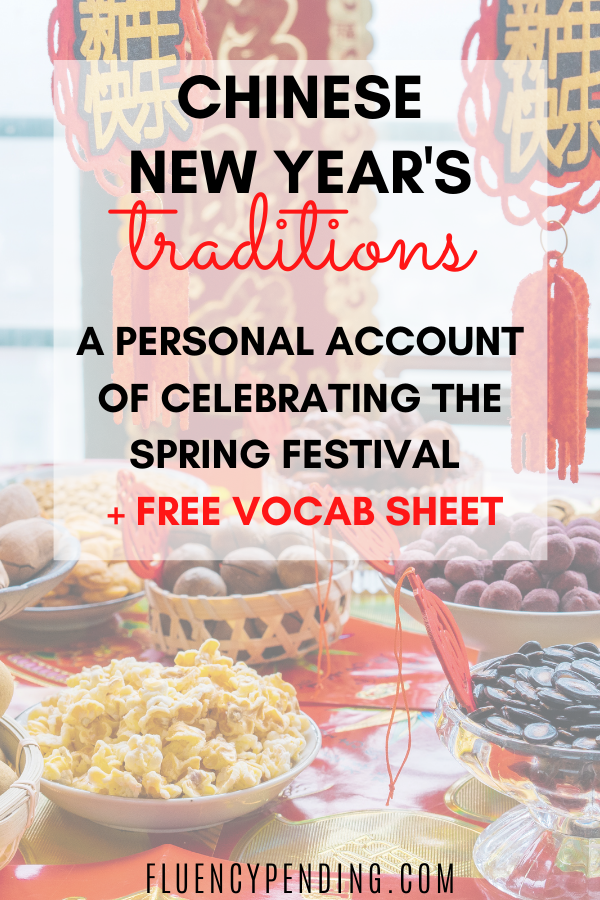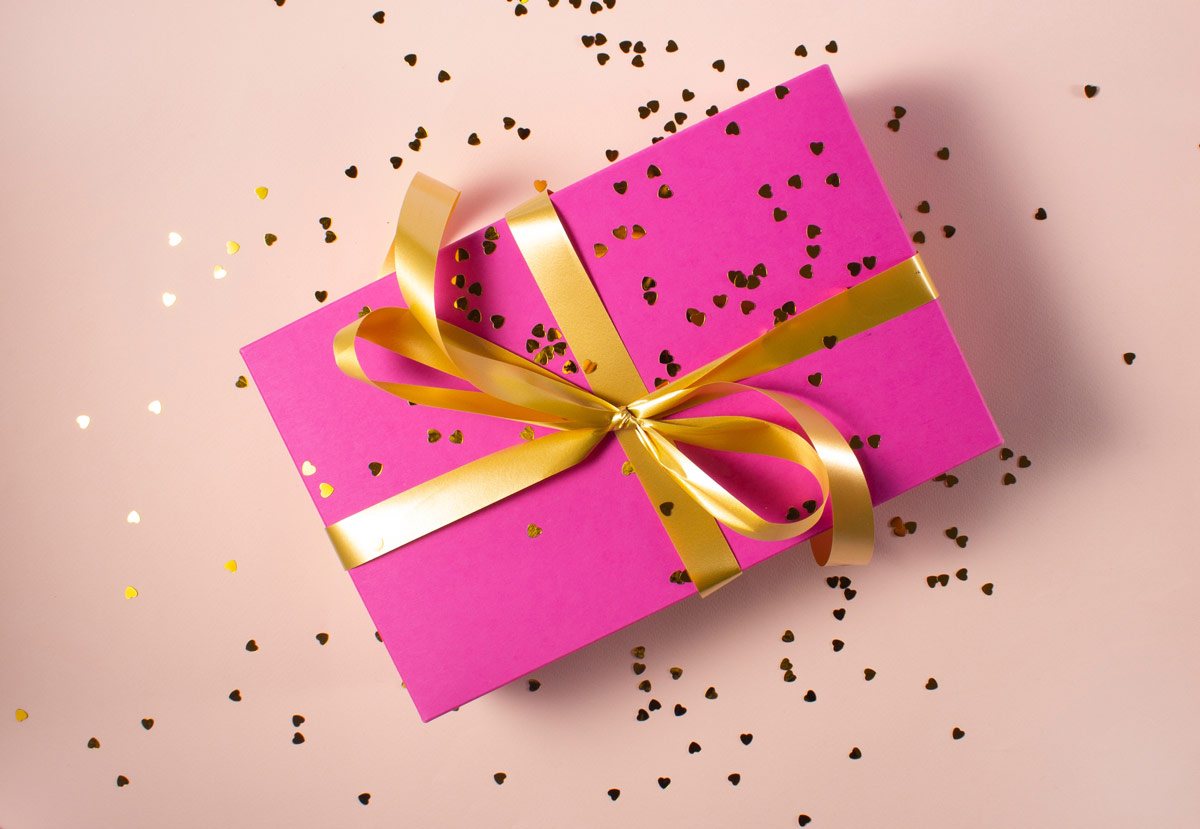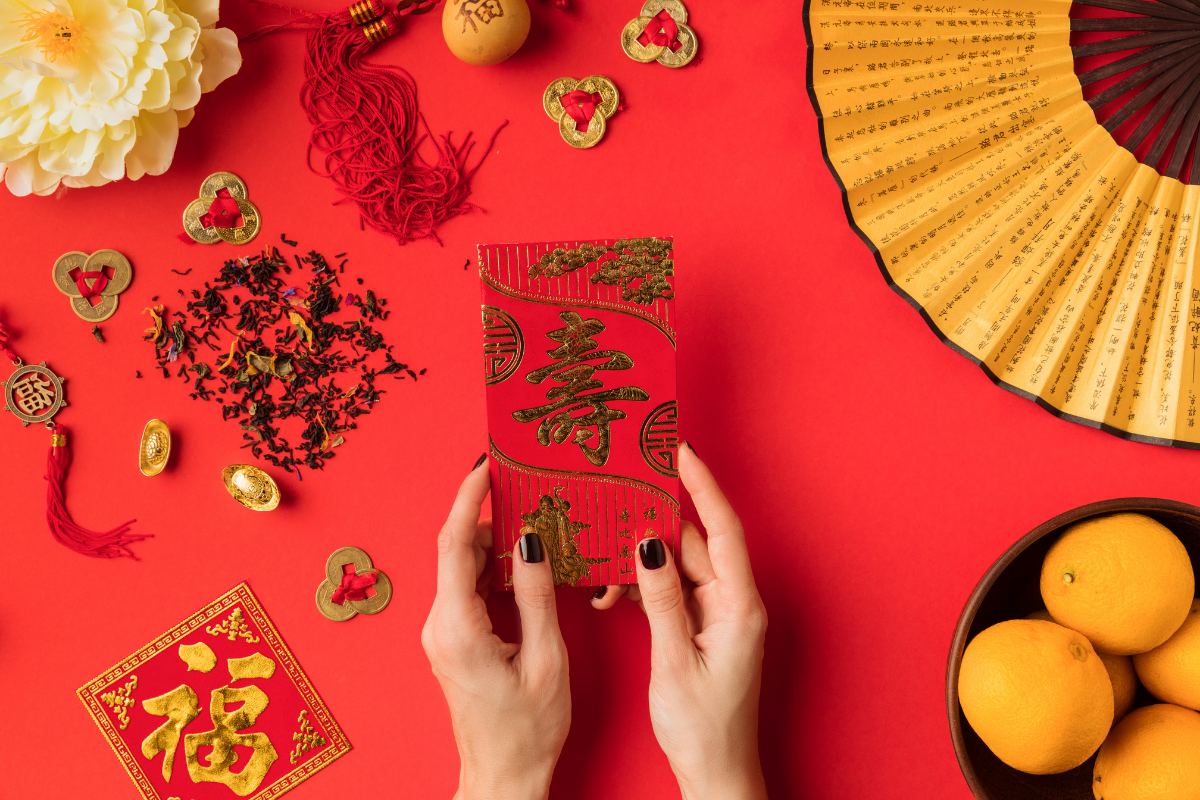
Memories of Spring Festival (Chinese New Year)
This is a guest post by Junjun from Little Jun’s Chinese. In this wonderful personal essay, she shares memories of celebrating Spring Festival with family, and describes various traditions and delicious food (seriously, prepare a snack before you read, you may get hungry!).
Junjun shares plenty of useful vocabulary related to the Spring Festival. You’ll find a link at the bottom of the article to download a vocabulary sheet with Pinyin support.
Over to Junjun…
For every Chinese or overseas Chinese, the Spring Festival has extraordinary significance. This festival not only means that the arrival of the New Year is accompanied by new hope, but it is also a day for family members to reunite and have a good time. Obviously, Wikipedia has made a very comprehensive description of the Spring Festival. However, I want to talk about the Spring Festival that I have experienced in my memory.
I come from the northeast of China, so every Spring Festival the northeast is very cold, almost minus 20 degrees. But when I was a child, I felt warm at heart, because I could meet my relatives, eat a lot of delicious food, watch beautiful fireworks, and most importantly, I could receive a lot of red pockets – money (although it was handed over to my mother in the end).
The Spring Festival generally lasts 15 days, and there are different things to do every day. From the last day of the previous year (大年三十 – Lunar New Year’s Eve), we celebrate the holidays. Let me talk about my favorite days during this time.
大年三十(Lunar New Year’s Eve)
I remember that on the morning of the last day before the Chinese New Year (the 30th of Lunar December), we would throw away the old couplets on the door, and 贴春联 (paste the new couplets): the right couplet (上联) on the right side of the gate, the left couplet (下联) on the left side of the gate, and the horizontal batches (横批 – the top scroll) on top of the door in between the two couplets.
The background color of the Spring Festival couplets is red, and the words on the paper are black or gold. The couplets contain words of blessing. In the middle of the door, the word “Fu” (福, which means blessing, good luck) is posted. And we would paste the word “Fu” upside down, which is homophonically similar to “Fu has arrived” (I will explain this later).
How did this tradition come about? There is a very interesting story.
There are other versions of the story, but I like this one the most. Of course, there are still many people who paste 福 upside-down on the trash can, which means to throw away bad luck. It’s because 倒 also has another meaning – to throw away.
After posting the 福, my parents and I would go to my great-grandparents’ (太爷和太奶 – dad’s grandparents) house to celebrate the New Year. I would meet all the relatives on my dad’s side.
When I was young, many people envied my family. When they heard that I had a great-grandfather and great-grandma, they said: “You are so blessed, 四世同堂 (four generations under the same roof) is so wonderful!”.
When the whole family gathers together, it suddenly becomes lively. I would watch TV, play poker, and eat sweets with other cousins around my age. The adults would prepare New Year’s Eve dinner in the kitchen. My great-grandfather often called me a “small rice bucket” because he thought I always ate too much. I called him “old rice bucket” because he ate a lot as well! But on New Year’s Eve, in any case, adults will always tell the children to eat more and eat more, and then keep giving us food! New Year’s Eve dinner usually starts at two or three in the afternoon.
In my memory, the New Year’s Eve dinner had these dishes:
- 熏鸡肉 – Smoked chicken
- 酱猪蹄 – Braised pork leg
- 酱牛肉 – Beef seasoned with soy sauce
- 鱼 – Fish (can be cooked in any ways in different families)
- 糖醋排骨- Sweet and sour pork ribs
- 可乐鸡翅 – Coke chicken wings
- 炒蒜毫 – Fried garlic
- 凉拌黄瓜 – Shredded cucumber with sauce
- 清炒荷兰豆 – Stir-fried snow peas
- 西芹炒腰果 – Stir-fried cashew nuts with celery
Here are a few interesting traditions and beliefs around food:
- The number of dishes must be even, which is more auspicious.
- The meaning of 酱猪蹄 (braised pork leg) is 挠扯 (northeast dialect) which means ‘working hard to make progress’.
- Fish can’t be eaten, which means 年年有余 (鱼). 年年有余 means every year you have excess wealth. 鱼 and 余 has the same pronunciation which means if we don’t eat fish up, we would have excess wealth. Some people don’t eat it at all, but they will cook it and put it on the table. My family does eat it but only a bit; we’ll eat about half and save the rest.
- We can’t eat pork knuckle, because the homonym of knuckle (肘子) is 走子(走 has a meaning of pass away, 子 means children, especially boys). So eating knuckle means that a child (especially a boy) will pass way, especially if there is a boy in the family, don’t eat 肘子.
During the meal, the family members sat happily together, chatting (唠家常 – northeast dialect). But the children couldn’t sit all the time. In the evening, my father took me and other relatives of the same age downstairs to set off fireworks and firecrackers. It’s really beautiful, but because firecrackers are not safe, there are not too many people setting off firecrackers in the city now. What I like the most is the 呲花 (a kind of firework). It is a thin stick, holding one in each hand. After lighting it, you can hold it with your hand and point it in the air in circles. It is shining and beautiful! Because the winter in the northeast is very cold, there are many snowdrifts during the Spring Festival. I would often put the 呲花 (thin stick firework) on the snowdrifts and light them.
At 8 o’clock in the evening, CCTV1 and other channels will simultaneously broadcast the Spring Festival Gala. The Spring Festival Gala started in 1983. It has become a tradition for Chinese people to watch the Spring Festival Gala every Spring Festival. There are singing and dancing programmes and funny sketches (comedies).
Please allow me to share a few classic Spring Festival Gala songs:
故乡的云 (Clouds in my homeland) by 费翔 (Kris Phillips) – 1987
相约九八 (Meet in 1998)by 王菲 (Faye Wong) and 那英 (Na Ying) – 1998
时间都去哪了? (Time flies so fast) by王铮亮 – 2014
难忘今宵 (Unforgettable tonight) by 李谷一 – 2020
Every Chinese knows this song, because it has been the last program in the Chinese gala every year since 1984, so it’s the theme song for this gala.
My family members would make dumplings while watching the Spring Festival Gala. Sometimes we would put a red date in a few dumplings. If someone ate it, then he would be lucky all year. In fact, the most primitive way is to put a coin in it, but that is not safe and hygienic, so we used red dates instead of coins.
At midnight, the host will lead everyone to count down, 5…4..3..2..1…过年好!HAPPY New Year!!! A new year begins! We would start eating dumplings! Our families usually eat dumplings stuffed with leek and shrimp and stuffed pork with celery, but there are more flavors.
大年初一(Lunar New Year’s Day)
A new year begins! I couldn’t wait to 拜年 (give New Year’s greetings) to the elders in my families! Usually, I would first give New Year’s greetings to the oldest person in the family, who were my great-grandparents!
I would say: 祝你们福如东海, 寿比南山;身体健康, 长命百岁!
I remember they prepared the 红包 (red envelopes or red pockets) and looked at me with a smile on their faces. They handed me a red envelope which said: I wish you a healthy and happy new year, and academic progress! There was 200 yuan in it. I was so excited that I quickly thanked them, then excitedly found my coat and stuffed the money into my pocket! One after another, I gave New Year’s greetings to nearly ten elders, and the money in my hands was also increasing. At this time of the year, I have a sense of accomplishment because I feel that I am a rich person.
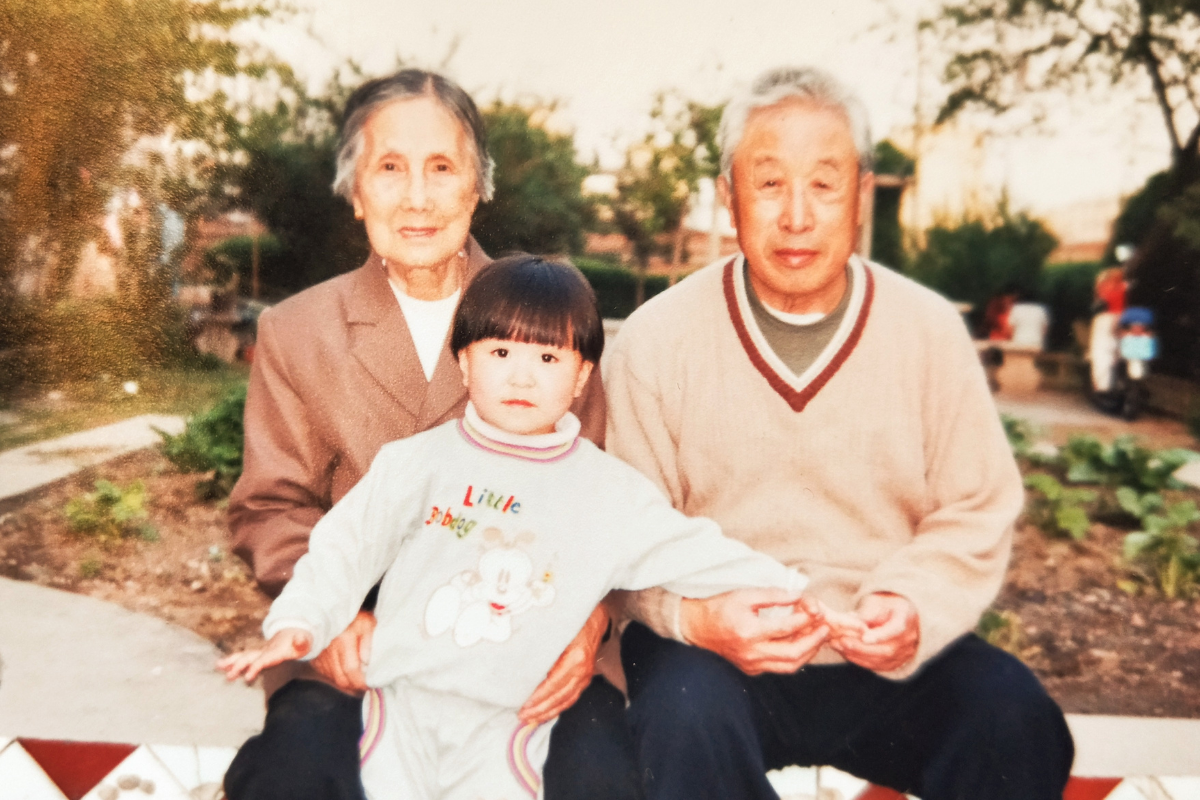
Junjun and her great-grandparents – 1 May 2002
In China, there is also 本命年 (the year of fate – animal year). Counting from your birth, every 12 year-old is a 本命年. Every year, there is a sign of the Chinese zodiac. I was born in 1998 (The year of the Tiger), so I am a tiger (in Chinese we say 我属虎). People in the animal year must wear red clothes, trousers and socks… I remember the Spring Festival when I was 12 years old, I was too sleepy to stay up late, but I told my mother, no matter what, I must wake up at 12 o’clock! So I remember when I just woke up I hurried to my great-aunt-in-law and she said: “Look at you, wearing little red pants and coming to pay me a New Year’s greeting!”
大年初二(Lunar New Year’s Second Day)
Normally, on the second day of the new year, we would leave my great-grandparents’ house and go to my grandma’s (mother’s mother) to continue celebrating the Chinese New Year. I would meet some relatives and continue making money! On the second day of the Lunar New Year, we were still the same as the first day, eating dumplings and having a reunion dinner.
大年初五 (Lunar New Year’s Fifth Day)
This day is also called 破五 (to break Fifth).You must eat dumplings on this day. There is a saying that there are more taboos from the first day to the fifth day, and people should not “do rashly”. After these days, people can celebrate and break these taboos by eating dumplings. But in my memory, I ate dumplings every day these days!
正月十五 (Lunar New Year’s 15th Day) as well as 元宵节 (Lantern Festival)
The Lantern Festival is also a day I like very much, because I can eat 元宵, made from soft sticky rice outside and sweet stuffing inside. My favorite 元宵 is sesame and peanut stuffing.
On this day, CCTV1 also has a Lantern Festival gala, and people will also participate in 猜灯谜 (guessing lantern riddles). People hang up colored lanterns and set off fireworks. Later, someone wrote the riddles on the paper and pasted them on the colorful lanterns for people to guess.
The structure of lantern riddles is composed of three basic elements, namely”谜面”, “谜目” and “谜底”. These three parts are indispensable.
- “谜面” is the condition to tell the guesser and the basis for the guesser to think.
- The “谜目” is to limit the type of “affair” that is guessed, and is the scope of the answer. It is like “seeking proof” in geometry.
- “谜底” is the answer.
I have more things to tell you about the Lantern Festival, so I will make a YouTube video. Have a look at my YouTube channel Little Jun’s Chinese if you are interested.
In short, this is the New Year in my memory. As I grow older, my anticipation for the Spring Festival is not as strong as when I was a child. Since the death of my great-grandparents a few years ago, the taste of the New Year has faded, so every time when I remember the past, I am very nostalgic.
With the development of internet technology, the way of sending New Year ‘s greetings is becoming more and more novel. People can send WeChat New Year’s greetings. My grandparents live in Guangdong (southern China), so they send me WeChat red envelopes. But I am a little embarrassed. I have already made my own money and I am still collecting money from them. I may always be a child in their eyes!
New Year’s greetings
Finally, I would like to share with you some New Year greetings.
2021 is the year of the Ox. I wish you all a good Year of the Ox!
牛年大吉!(Best of luck in the Year of the Ox)
过年好!祝您身体健康,万事如意,牛年行大运!
Happy New Year! I wish you good health, all the best, and great luck in the Year of the Ox!
牛年好运长似龙,家庭和睦多兴隆。生活之路处处通,事业爱情双双红。
In the Year of the Ox, good fortune is like a dragon, and family harmony is prosperous. The road to life is smooth everywhere, career and love (relationships) are both red (go smoothly).
一帆风顺吉星照,万事如意步步高。四季平安春常在,财源滚滚福年来。
Smooth sailing with lucky stars shining. Everything goes smoothly and makes huge progress. The four seasons are safe and spring is always there, and the wealth is rolling in forever.
金牛扬鞭辞旧岁,五虎长啸迎春来。旧岁再添几个喜,新年更上一层楼。
Gold Ox screams farewell to the old year, and the five tigers roar to welcome the spring. Add a few more joys in the old year, and the new year will go to the next level.
金牛到来,好运跟你走!祝你笑口常开,牛气冲天!
Gold Ox arrives, good luck be with you! I wish you a lot of laughter and bullishness!
牛年春节祝福慢慢送,一送你缘分的“缘”,送一个祝福是一种缘;二送你财源的“源”,祝你新的一年有财源;三送圆满的“圆”,愿你家庭幸福团团圆圆!
The blessings for the Spring Festival in the Year of the Ox are sent slowly, first to give you my blessing is a kind of fate between us (I am lucky to have the opportunity to send you my blessings), second to send a blessing of wealth, then wish your family happiness and reunion!
(缘, 源 and圆 has the same pronunciation with different good meanings)
缘-缘分 – fate/destiny
源-财源 -wealth
圆-团圆 – reunion with families
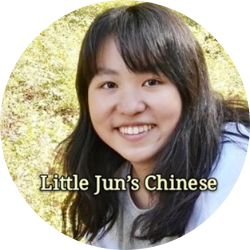
About Junjun
Hey, everyone! My name is Junjun and I’m from Liaoning, China. I am a Mandarin Chinese teacher online as well as a part-time freelance translator. I have started a YouTube channel and I make videos related to useful Chinese, Chinese culture and hopefully one day I can sing Chinese songs while playing the guitar.
My favourite quote is 功不唐捐(All efforts are not made for nothing).
加油, everyone!
Do you celebrate the Spring Festival? What are some of the traditions you and your family enjoy?
.

